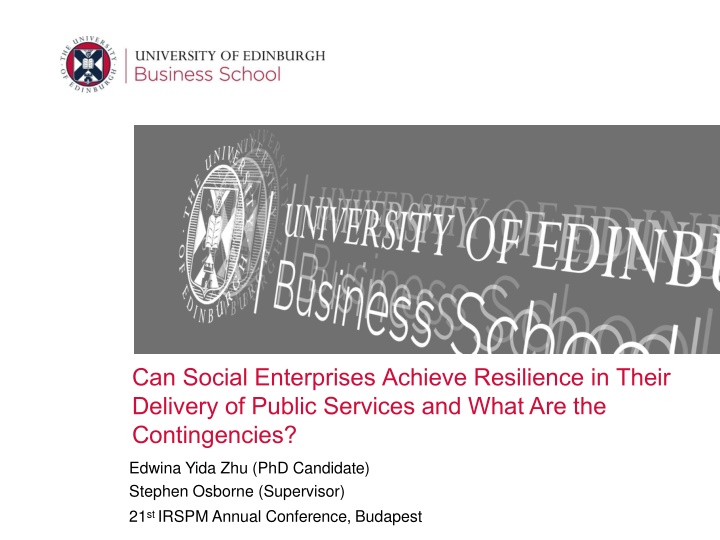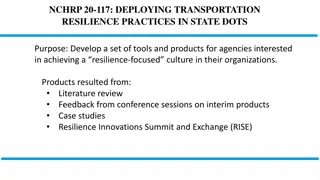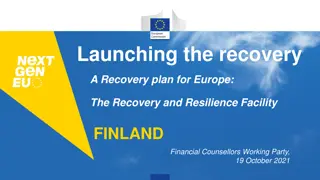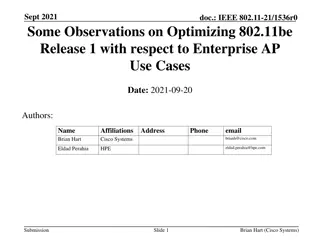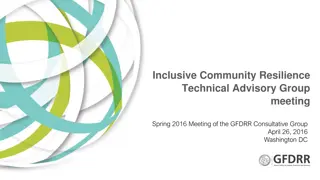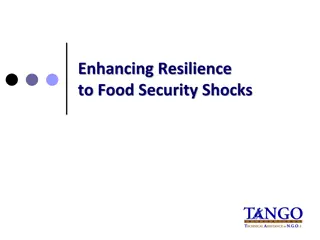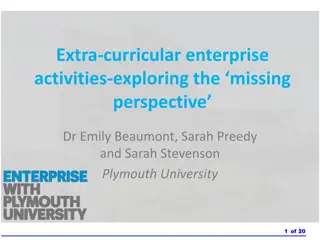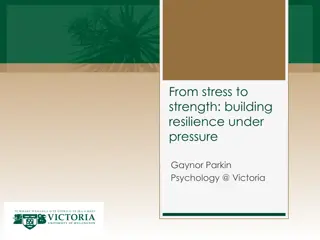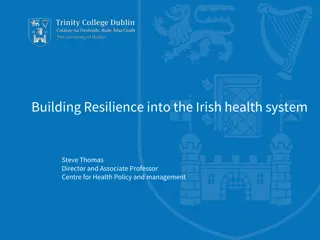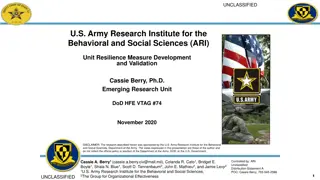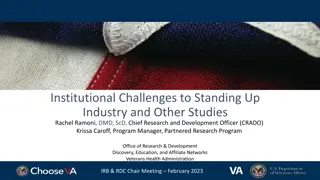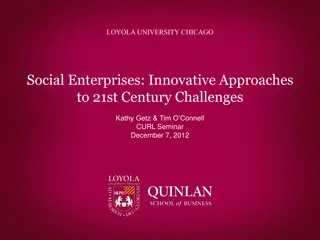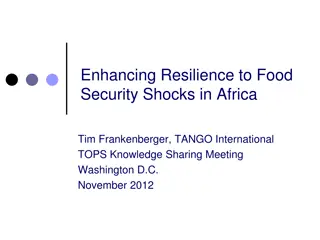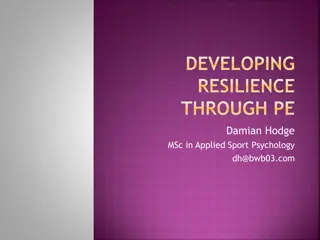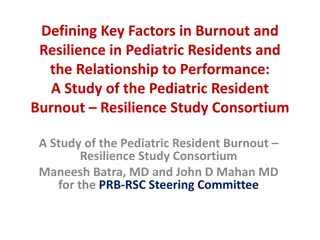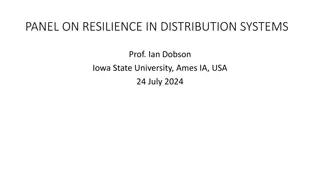Achieving Resilience in Social Enterprise Delivery of Public Services
Social enterprises play a crucial role in the delivery of public services, with a focus on social missions and employing business approaches. This study explores the resilience of social enterprises in Scotland, examining factors such as diverse perceptions of social enterprise, resilience indicators, and the impact of trading activity on defining social enterprises. The research highlights the importance of understanding different perspectives and challenges in achieving resilience within the social enterprise sector.
Download Presentation

Please find below an Image/Link to download the presentation.
The content on the website is provided AS IS for your information and personal use only. It may not be sold, licensed, or shared on other websites without obtaining consent from the author.If you encounter any issues during the download, it is possible that the publisher has removed the file from their server.
You are allowed to download the files provided on this website for personal or commercial use, subject to the condition that they are used lawfully. All files are the property of their respective owners.
The content on the website is provided AS IS for your information and personal use only. It may not be sold, licensed, or shared on other websites without obtaining consent from the author.
E N D
Presentation Transcript
Can Social Enterprises Achieve Resilience in Their Delivery of Public Services and What Are the Contingencies? Edwina Yida Zhu (PhD Candidate) Stephen Osborne (Supervisor) 21st IRSPM Annual Conference, Budapest
Social Enterprise Changes in the public service delivery and the rise of public service organisations (PSOs) (Osborne and Strokosch, 2013) Social Enterprise (SE): the primacy of social aims and the employment of business approach (Peattie and Morley, 2008) There has been strong support taking place in Scotland over the last decade (British Council, 2015). A full role in public service reform through a greater involvement in the design and delivery of services and sustainable economic growth (Scottish Government, 2012). We will continue to encourage and support the delivery of specialised business support to enable social enterprise start-up, growth and resilience (Scottish Government, 2016, p35). 2
Exploratory Interviews Methodology tool: Semi-structured interviews Interviewees: 19 Group Scottish Government (GOV) Local council/aut hority (LOC) SE support bodies(SEU) Member of Scottish Parliam ent (MSP) Independent consultant (INP) Third/volunt ary sector umbrella organisation (TSU) Number 5 5 5 1 1 2 Explored the perception and understanding of social enterprise, social enterprise resilience and social enterprise in public services delivery in Scotland 3
Exploratory Interviews SE Perception: Social mission, Business and tradingactivity BUT interviewees from different groups have different perceptions and claims of social enterprise. There is a huge grey area about the businessside. We are more interested in seeing more enterprising behaviours across the third sector (GOV4). S o I suppose for me as long as there is some trading activity and the benefit goes back into the cause and the values and ethos behind it is for a social enterprise model, then I will say it is a social enterprise. I probably don t stick with what as those people say about over 50% of trading income or more. I suppose I see it a lot broader. I tend to look at the third sector in general not specifically social enterprise. (TSU2) A very simple definition is that it s a business which specifically delivers social or environmental purpose. So it s set up to deliver that purpose But in terms of trading we say we are very liberal and saying basically inspiring trading. (SEU5) SE Resilience: Diverse understandings of resilient social enterprise, including a) ability to continue; b) ability to grow c)independence from grant funding; d) diversifying income source; e) having a reserve for business to carry on; f) a sustainable business; g) good leadership and good governance; h) paying livingwage. BUT expectations on better businessperformance I suspect they maybe hang longer because of the social mission I would argue there is a potential drive by the nature of the sector which makes them more resilient or makes them appear more resilient. But whether that is real in terms of financial ability or anything else is debatable. (SEU2) 4
Exploratory Interviews Social Enterprise and Public Services: -Recognition of social enterprise s role in addressing unmet service needs. My experience in several sites I ve been to, which are social enterprises, delivering social services, is that they take a much more robust approach to really and truly genuine understanding of the needs of people, in their family, in the community they are trying to sort or they are trying to work on So where public services aren t meeting the needs of people they are helping achieve a bit what Scotland people want to see. (GOV1) BUT - The awareness or understandings of social enterprise varied among local authorities; - Lack of collaboration in local social enterprise development; - Concern about social enterprises capability in services delivery; - Social enterprises low engagement in public contracts. 5
Social Enterprise and Resilience Social Enterprise Resilience Social enterprise s hybrid nature sustains its existence (Laville & Nyssens, 2001). The concept refers to how an ecosystem maintains its stable relationships with external environments for persistency (Burnard Holling, 1973; Walker, Holling, Carpenter, & Kinzig, 2004). state and stable The hybrid nature makes it particularly challenging to manage a social enterprise (Borzaga & Solari, 2001) since little is known about the required management competencies (Peattie & Morley, 2008). & Bhamra, 2011; Organisational organisation s responses to disturbances (Gallopin 2006), which reflects the ability to withstand disruptions capability to adapt to new environments (Starr et al., 2003; Crichton et al., 2009). resilience refers to an The influence of environment causes the instability between its social purpose and economic success (Young, 2012; Young et al., 2012). as well as the A significant lacuna in the study of long term dynamics of social influence of environment on its long term behaviours (Young, 2012; Young, Kerlin, Teasdale, & Soh, 2012). enterprise and the 6
Research Questions unsolved internal conflict and uncertain interactions with external environments stable state and stable relationships with external environments 1. How does the environment affect social enterprise s resilience? 2. What strategies does social enterprise adopt to achieve resilience and why? 3. Under what contingencies can social enterprise achieve resilience? 7
Methodology 1. A multiple case study 2. Inductive approach 3.Semi-structured interviews, non-participatory observations and document analysis 4. Data analysis with NVivo 8
Case Studies The four case social enterprises have similar social missions to enhance employability and empower the local community. Name No. of paid employee Sector/activity Year of establish ment 2012 Legal structure Income sources Art House 6 Creative industry, education,entertaining and retail Private limited companyby guarantee Funding grants,fees from various arts workshop andevents, sales Funding grants,fees from various arts workshop andevents, sales Public sector contracts, private sector contracts, sales Public sector contracts, private sector contracts,third sector contracts, sales Bistro Gallery 9 Hospitality, educationand retail 1993 (trading 2012-2017) Private limited company undera charity Business Park over 200 Property maintenance, property management, conference, education, home care Security, hospitality and wine industry 1988 Private limited companies undera charity Security & Pub over 50 2012 Community InterestCompany (Private limited company by guarantee) 9
Preliminary Findings 1 1. A divide in perception of social enterprise Economic-mission oriented Social-mission oriented Business Park Security & Pub Art House Bistro Gallery 10
Preliminary Findings 1 1. A divide in perception of social enterprise Social-mission oriented We try to trade as a business but we are not because we are doing all the stuff for free. We determine not to But we are not about the money and it s all about the people. So we have to find a gentle way making sure that we don t make change or lose that. But I always make sure I am here for the big. ( ArtHouse) So we had a lot of members who were employable, but just not given that first opportunity because hadn t been employed for so long or hadn t been in any employment. So the reason why Bistro Gallery was set up is twofold. One for progression and two the idea was that the social enterprise will support the charity so any profit from the social enterprise will go back to the charity I think we won t be sustainable and we are not going to be totally away from funding. The reality is we have staff and that s a lot with the training programme (BistroGallery) Art House Bistro Gallery 11
Preliminary Findings 1 1. A divide in perception of social enterprise Economic-mission oriented My view is social enterprise, two words and enterprise is about business. You cannot have one without the other. A social enterprise doesn t have a business is not a social enterprise in my view. It needs to have the enterprise. There are a lot of organisations out there who call them social enterprises but they are not because they don t have the enterprise The delivery of social goals and objectives is delivered higher up the ladder. (Business Park) Business Park Security & Pub Actually as a true social enterprise, the name is in the title, enterprise. It trades, generates profit, reinvests profit back in the social objectives. That is a true social enterprise. It s not a trading arm in the charity. It just happens to fit into that but not what it is. As I told, it is not a subsidised business, which is subsidised by grants, people s donations. I don t believe any of that. My belief is that it trades, makes profit, reinvests profit back in the social objectives First and foremost, we do business. (Security & Pub) 12
Preliminary Findings 1 1. A divide in perception of social enterprise Social-mission oriented Economic-mission oriented Business Park Security & Pub Art House Bistro Gallery However, I m reluctant to call myself as a social enterprise because of the perception that the social enterprise sector has So we are moving away from that and I m trying to go back to the idea of thinking ourselves as a community business. Because we believe being a social enterprise is running the risk of damaging our brand Social enterprise in general, unless our clients are very well informed, some say them a sector amateur, not opt to the job, not business focused. (Business Park). We don t concentrate on it too much. We do want to think that we are the only SE in the private security industry. That s fine. Apart from that, I don t think people come and visit us because of what we did (Security & Pub). There is one in Edinburgh at the moment. It s all over the news. It s fantastic. It s the best thing ever. When I started digging, it s actually a commercial business. They are using an aspect of, they are using homelessness to highlight business because they make donation or support to this. When you look at the actual percentages, it s a tiny percentage. (Art House) As a social enterprise, Social Bite, that s so commercial. Certainly been there at his talk, because I just thought the majority of his staff. There was a small minority are actually homeless. And the rest are absolute professional. (Bistro Gallery) 13
Preliminary Findings 2 2. A divide in understanding ofresilience It needs to be people resilient. The whole thing to me about resilience is that it needs to be self-sustainable with the opportunity to grow, with progression. Because actually you can t just sit there day in and day out. Because people change so you have to change. But you have to listen to them and be ahead of them. It s an interesting sort of dilemma. It needs to be resilient in these people and it needs to be resilient in its own financial controls. (Art House) Resilience of social mission I think one of the very difficult things at the very beginning was that I have really emphasised the training part. It was so important, more important than the income generation. Because if we do not have a training programme, we have nothing So if we don t have that, there is no more funding We are still a commission business and we still have an income I can t go to the funder and say could you give us that money? An they turn to say why you close two days a week? You could make that money yourself. So you have to try it. (BistroGallery) Our fundamental belief is that you cannot do what you do in the community unless you have a successful business. Without a successful business you can t do thatstuff. Therefore your focus has to be on making a successful business (BusinessPark) Resilience is how business continues in front of contingencies. So continue businesses even in the worst environments. And have enough money to be able to carry on. If everything goes wrong, what do we do and how long we can survive? (Security & Pub) Resilience of economic mission 14
Preliminary Findings 3 3. Strategies to achieve resilience and diverse consequences a)Internal tensions What Angela has miraculously managed to do for 6 years is to coordinate this group of un-coordinating or uncoordinated people. And the strange other thing about them is the people that Art House is there to help and to support are the same people that are volunteering The new infraction people with a possible couple of perceptions have not got that. And they, instead of maximising this force which is volunteer, they are almost cutting them out (Art House). We are 7 days a week to make money. What is helpful is that additional staff can come three days a week so I can fill up trainers. But it s not often because we have business. We don t have a venue to deliver training The challenge is that it needs to be more economic viable, not compromising the activity of trainee project. It s hard. It s hard for them. Sometimes I feel, not at a war but sometimes I feel that I m here to protect trainee programme. And sometimes there would be tension between me and money making (Bistro Gallery). b) Evolvement of social mission We have the problem of recruiting and retaining staff in care home People from care home need to self- organise everything out there but they couldn t do this. They need more organised job. We are looking for that and state it clearer in the advertisement. A more structured interview, asking why you want to do that job (Business Park). I think even when Chris started it up, it was a security firm initially as I understand. The training part of it grew bigger and bigger. Then he realised that could be a good opportunity, the training side. So should the company focus on security or training? At the moment, we are doing both We have to have good information to see how well are they doing? How well the catering, the training side was doing last year? You measuring the costs particularly. (Security &Pub). are 15
Discussion Protection of social mission (Battilana & Dorado, 2010; Phillips, 2006; Vickers & Lyon, 2014). Does this strong organisational culture (Gro nroos, 2011) help social enterprise to deliver the services for resilience or does it cover the importance of changing environment, blunt reaction (Lorsch, 1986) and undermine the ability to adapt, innovate and grow (Schein, 1991, p. 206)? Multi-stakeholders important resource providers (Freeman, 2010) and resource dependence (Pfeffer & Salancik, 2003). Does this a chameleon-like characteristic (Seanor and Meaton, 2008) help social enterprise shape the environment for its own resilience (Teasdale, 2010) or does it drifting? Social enterprise at institutional level An institutional cipher or a concept for legitimacy? 16
Thank you! Q&A 17
